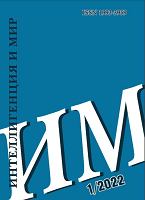Винсент Д’абернон и Франко-Британская Военно-Дипломатическая миссия в Польше (1920 г.)
Vincent d’Abernon and the Franco-British Military-Diplomatic Mission in Poland (1920)
Author(s): Nikita D. SorokinSubject(s): Diplomatic history, Interwar Period (1920 - 1939)
Published by: Ивановский государственный университет
Keywords: W. d’Abernon; J. Pilsudski; M. Weigan; P. Radcliffe; Lloyd George; “Miracle on Vistula”; Polish-Soviet War; Peace of Riga; Warsaw; Red Army;
Summary/Abstract: The conclusion of the Riga Peace Treaty in 1921, which put an end to the Soviet-Polish war of 1919—1921, was a direct consequence of the defeat of the Red Army in August 1920. A number of researchers associate the success of the Polish army exclusively with the military genius of the Polish leader Joseph Pilsudski, forgetting that during those fateful days a Franco-British military-diplomatic mission worked in Warsaw, one of the leaders of which was the Englishman Lord Vincent d’Abernon. This article examines the role and place of the Franco-British military-diplomatic mission in the “Miracle on the Vistula”, as well as the personal contribution of d’Abernon to the victory of the Allies. The author pays special attention to the issues of relations between the members of the mission with the Polish political and military establishment, as well as the diplomatic efforts that were undertaken by d’Abernon in the course of consolidating the positions of London and Paris and broadcasting these instructions to Warsaw. The author used the historical method as a technique for analyzing numerous diaries and memoirs of participants of those events, as well as a historical and systematic method that allows placing the studied events in the context of the architecture of international relations on the European continent of the period under study. As a result of the work done, the author comes to the following basic conclusions: 1) the success of the Polish army in the Battle of Warsaw is directly related to the implementation by Pilsudski of those organizational and military-tactical recommendations that were given by the Franco-British military-diplomatic mission; 2) the key role in the “Miracle on the Vistula” was played by the political and military support of Poland by Britain and France, which, in turn, was made possible by the provision of timely and highly accurate analysis of events by Lord d’Abernon; 3) the “dirty diplomatic game” that Moscow conducted with Warsaw and members of the mission helped d’Abernon to develop an approach to dealing with the “Soviet threat” as His Majesty’s ambassador in Berlin.
Journal: Интеллигенция и мир
- Issue Year: 2022
- Issue No: 1
- Page Range: 100-126
- Page Count: 27
- Language: Russian

